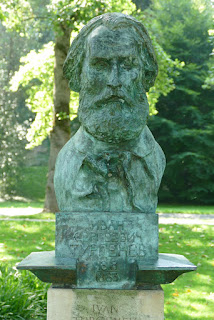I am sure that the title of this post is surprising, but as I have written on many occasions Goethe turns up in the most surprising places. Turgenev is a writer I like. His short works remind me of late-19th-century German Novellen. Think
Eduard von Keyserling, a Baltic German poet (1855–1918). Never heard of him? Well worth reading: about the last days of the German aristocratic families in the Baltic provinces. They too are set in the countryside among the landed class. One of my favorite novellas of Keyserling's is
Am Südhang, about which there are actually some online
blogposts. It has even been made into a
movie. (If anyone knows how I can view it, please let me know. Although, on the other hand, it might spoil my pleasure in the story.) Recently I read Keyserling's novel
The Waves (Die Wellen). Keyserling has often been compared to Theodor Fontane. Those late-19th-century German works were my favorite reading when I became good enough to read German prose. And back then I also liked Turgenev, although in English translation.
So, today, Goethe and Turgenev, prompted by a review in the TLS (9/30/22) by A.N. Wilson of some new translations. Wilson begins right off the bat by writing "No one can really translate Shakespeare or Dante or Goethe, which is why it is worth learning their languages if you want to appreciate their essence." I guess I am fortunate to be a native English speaker, but it doesn't make understanding Shakespeare any easier. Goethe writes such beautiful poetry that I am really fortunate to be able to read it in the original. I feel bad that most people I know can't appreciate its "essence."
 |
Turgenev, ca. 1850
|
Wilson's long review sums up a lot of critical reaction to Turgenev: there is something incomplete about his gift. For instance, instead of developing a character, he rounds off his stories "with arbitrary deaths." This is on view in
Fathers and Sons, when the radical Bazarov doesn't come to terms with his radicalism in the end. Instead, he simply dies. Wilson also feels let down by the denouement in
Love and Youth. But alongside this criticism of the newly translated editions, Wilson also reviews the book
Hunting Nature: Ivan Turgenev and the Organic World by Thomas P. Hodge, which Wilson finds the "best analysis of Turgenev yet written." This is where Goethe comes in, namely the 1783 essay
Die Natur, which was once attributed to Goethe and, so Wilson, "made a lasting impression on Turgenev."
Wilson, quoting from the essay, says that Goethe saw nature "as a goddess-like figure." This is the quote from the essay with She/Her referring to "nature":
We are surrounded by her and locked in her clasp: powerless to leave her and powerless to come closer to her ... She creates new forms without end: what exists now, never was before; all is new yet always the old.
This is indeed a correct translation of the German, although the essay does not use the terms "goddess," but speaks of "Natur!"" In any case, Wilson writes that Turgenev assimilated Goethe and Schelling's notion that "nature is unitary, monistic, and inclusive of humanity." The English words have so little heft compared with the "essence" of the German:
Wir sind von ihr umgeben und umschlungen -- unvermögend aus ihr herauszutreten, und unvermögend tiefer in sie hineinzukommen. ... Sie schafft ewig neue Gestalten; was da ist war noch nie, was war kommt nicht wieder. Alles ist neu und doch immer das Alte.
It should be added here, however, that Goethe did not actually write the essay in question, although it was attributed to him. When asked about it in 1828, he wrote that he could not remember having written it, but that the ideas contained in it reflected an early stage of his scientific development. That is of course beside the point in the present case, as most people in the 19th century, including Turgenev, thought it was by him.
 |
Turgenev hunting
|
In any case, Turgenev, according to the review, believed "in the epic wholeness of nature and also recognized, as who cannot, nature's indifference to humanity." The novels reflect nature's pitilessness, often expressed comically. Wilson finds
Fathers and Sons to be a "book of profound empathy with nature and a deeply intelligent awareness of why farmers, peasants, landowners, and, yes, even hunters are aware of what nature
is, an awareness that living in a town will numb and eventually kill."
Since Goethe sort of owned the essay "Die Natur," we might as well
accept that it represents his ideas to some extent. And, yet, Goethe did
not have the world-weary late-19th-century awareness that living in a
town "numbs and kills." That is the insight of a later day. Turgenev, it seems, was a great hunter, which is not something that present-day intellectuals expect of a great writer, detached as we are, as Wilson writes, from the land and regarding the hunting of animals for pleasure as abhorrent. For Wilson, by not accepting that aspect of Turgenev, we get his writing "fundamentally wrong": "we shrink from realizing that his greatest work ... was in his profound insights into nature itself."



